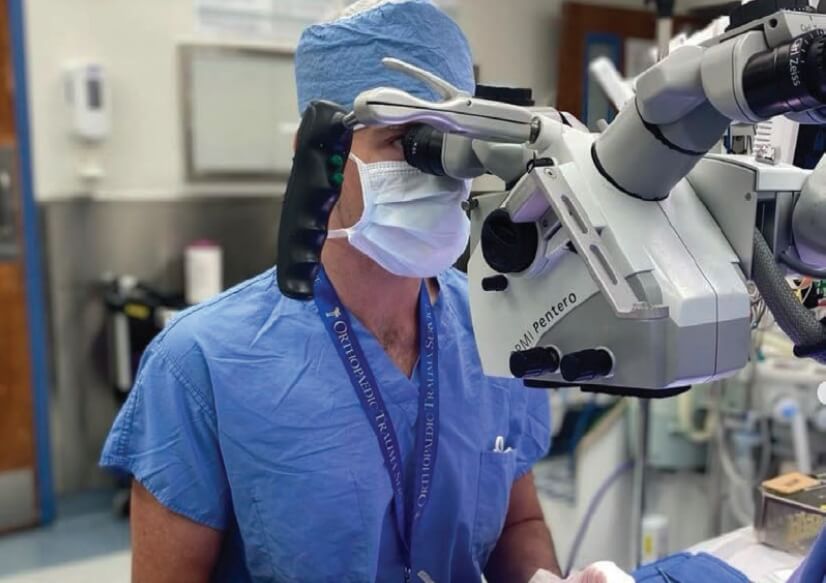Orthopedic specialties
Florida Orthopaedic Institute physicians provide responsive, personalized care as quickly and painlessly as possible for every patient, regardless of musculoskeletal injury or condition.

Care options by specialty
We make it easy to get on the path to recovery with unparalleled, specialized care for your pain or injury—from diagnosis and treatment to pain management and rehabilitation.
- Arthritis
- Chiropractic
- Diagnostic Imaging
- Elbow
- Foot, Ankle & Lower Leg
- General Orthopedics
- Hand & Wrist
- Hip & Thigh
- Independent Medical Exam
- Joint Replacement
- Knee & Leg
- Orthopedic Trauma
- Outpatient Surgery
- Pain Management
- Physical & Occupational Therapy
- Plastic Surgery
- Podiatry
- Shoulder
- Spine
- Sports Medicine
- Surgery
- Telemedicine
- Urgent Care
- Workers’ Compensation
- Wound Care

Care options by body part
From head to toe, we’ve got you covered. Powered by advanced technologies and techniques, our team of leading orthopedic specialists give you the time and treatments you need to keep active.



Heal back & neck pain
- Anterior Cervical Corpectomy & Discectomy
- Artificial Disc Replacement (ADR)
- Bone Cement Injection
- Degenerative Disc Disease
- Diffuse Idiopathic Skeletal Hyperostosis (DISH)
- Discectomy
- Discitis Treatment & Information
- Epidural Injections for Spinal Pain
- Interlaminar Implants
- Interlaminar Lumbar Instrumental Fusion: ILIF
- Kyphoplasty (Balloon Vertebroplasty)
- Kyphosis
- Laminectomy: Decompression Surgery
- Lumbar Epidural Steroid Injection
- Lumbar Interbody Fusion (IBF)
- Outpatient Spine Surgery
- Pinched Nerve
- Piriformis Syndrome
- Sacroiliac Joint Pain
- Sciatica
- Spinal Fusion
- Spine
- Spondylolisthesis & Spondylolysis
- Vertebroplasty
- Whiplash & Whiplash Associated Disorder (WAD)

Elbow pain relief
- Arthroscopic Debridement of the Elbow
- Aspiration of the Olecranon Bursa
- Cubital Tunnel Syndrome
- Elbow
- Elbow Bursitis
- Elbow Injuries & Inner Elbow Pain in Throwing Athletes
- Golfer’s Elbow
- Growth Plate Injuries of the Elbow
- Hyperextension Injury of the Elbow
- Little Leaguer’s Elbow (Medial Apophysitis)
- Olecranon Stress Fractures
- Radial Tunnel Syndrome
- Tennis Elbow Treatment
- Tricep Pain & Tendonitis
- UCL (Ulnar Collateral Ligament) Injuries
- Valgus Extension Overload

Heal foot & ankle pain
- Achilles Calcific Tendinitis
- Achilles Tendon Rupture
- Ankle Fracture Surgery
- Ankle Fractures (Broken Ankle)
- Ankle Fusion Surgery
- Arthroscopic Articular Cartilage Repair
- Arthroscopy of the Ankle
- Bunions
- Charcot Joint
- Common Foot Fractures in Athletes
- Foot Stress Fractures
- Foot, Ankle & Lower Leg
- Hallux Rigidus Surgery – Cheilectomy
- Hammer Toe
- High Ankle Sprain (Syndesmosis Ligament Injury)
- Intraarticular Calcaneal Fracture
- Lisfranc Injuries
- Mallet, Hammer & Claw Toes
- Metatarsalgia
- Neuromas (Foot)
- Plantar Fasciitis
- Sprained Ankle
- Total Ankle Replacement
- Turf Toe

Care for hand & wrist pain
- Basal Joint Surgery
- Carpal Tunnel Syndrome
- De Quervain’s Tenosynovitis
- Dislocated Finger
- Distal Radius Fracture (Broken Wrist)
- Dupuytren’s Disease
- Flexor Tendonitis
- Fractured Fingers
- Functional Nerve Transfers of the Hand
- Ganglion Cysts
- Hand & Finger Replantation
- Hand & Wrist
- Hand Nerve Decompression
- Hand Skin Grafts
- Nerve Pain
- Peripheral Nerve Surgery (Hand) Revision
- Revascularization of the Hand
- Rheumatoid Arthritis of the Hand
- Sports Wrist & Hand Injuries
- Sprained Wrist
- Sudden Acute Finger, Hand & Wrist Injuries
- Targeted Muscle Reinnervation (TMR)
- Tendon Transfers of the Hand
- Thumb Ulnar Collateral Ligament Injuries
- Trigger Finger
- Ulnar Neuritis
- WALANT (Wide Awake Local Anesthesia No Tourniquet)
- Wrist Arthroscopy
- Wrist Fractures
- Wrist Tendonitis

Hip pain care
- Anterior Hip Replacement
- Avascular Necrosis (Osteonecrosis)
- Bone Health Clinic
- Groin Strains & Pulls
- Hamstring Injuries
- Hip & Thigh
- Hip Arthroplasty
- Hip Arthroscopy
- Hip Dislocation
- Hip Flexor Strains
- Hip Fractures
- Hip Hemiarthroplasty
- Hip Impingement Labral Tears
- Hip Muscle Strains
- Hip Pointers & Trochanteric Bursitis
- Iliopsoas Tenotomy
- Labral Tears of the Hip (Acetabular Labrum Tears)
- Osteoarthritis of the Hip
- Pelvic Ring Fractures
- Piriformis Syndrome
- Sports Hernias (Athletic Pubalgia)
- Thigh Fractures
- Thigh Muscle Strains

Knee pain treatment
- ACL Injuries
- Arthroscopic Chondroplasty
- Articular Cartilage Restoration
- Deep Thigh Bruising
- Fractures of the Tibial Spine
- Iliotibial Band Syndrome
- Knee & Leg
- Lateral Collateral Ligament (LCL) Injuries
- MACI
- Medial Collateral Ligament Injuries
- Meniscus Tears
- Muscle Spasms
- Muscle Strains of the Calf
- Partial Knee Replacement
- Patellar Fracture
- Quadriceps Tendon Tear
- Runner’s Knee
- Senior Strong
- Shin Splints
- Total Knee Replacement Surgery

Heal shoulder pain
- AC Joint Injuries
- Atraumatic Shoulder Instability
- Bankart Repair
- Bicep Tenodesis
- Broken Collarbone
- Bursitis of the Shoulder (Subacromial Bursitis)
- Calcific Tendinitis of the Shoulder
- Clavicle Fractures
- Dislocated Shoulder
- Foraminotomy
- Fractures of the Shoulder Blade (Scapula)
- Glenoid Labrum Tear
- Impingement Syndrome of the Shoulder
- Little League Shoulder
- Reverse Total Shoulder Replacement
- Rheumatoid Arthritis (RA) of the Shoulder
- Rotator Cuff Tears
- Shoulder
- Shoulder Arthritis
- Shoulder Arthroscopy
- Shoulder Injury: Pain in the Overhead Athlete
- Shoulder Separations
- Shoulder Socket Fracture (Glenoid Fracture)
- SLAP Tears & Repairs
- Subacromial Decompression
- Trapezius Strain (Muscle Strain Of The Upper Back)
- Traumatic Shoulder Instability

Care options by body part
From head to toe, we’ve got you covered. Powered by advanced technologies and techniques, our team of leading orthopedic specialists give you the time and treatments you need to keep active.
Heal back & neck pain
- Anterior Cervical Corpectomy & Discectomy
- Artificial Disc Replacement (ADR)
- Bone Cement Injection
- Degenerative Disc Disease
- Diffuse Idiopathic Skeletal Hyperostosis (DISH)
- Discectomy
- Discitis Treatment & Information
- Epidural Injections for Spinal Pain
- Interlaminar Implants
- Interlaminar Lumbar Instrumental Fusion: ILIF
- Kyphoplasty (Balloon Vertebroplasty)
- Kyphosis
- Laminectomy: Decompression Surgery
- Lumbar Epidural Steroid Injection
- Lumbar Interbody Fusion (IBF)
- Outpatient Spine Surgery
- Pinched Nerve
- Piriformis Syndrome
- Sacroiliac Joint Pain
- Sciatica
- Spinal Fusion
- Spine
- Spondylolisthesis & Spondylolysis
- Vertebroplasty
- Whiplash & Whiplash Associated Disorder (WAD)
Elbow pain relief
- Arthroscopic Debridement of the Elbow
- Aspiration of the Olecranon Bursa
- Cubital Tunnel Syndrome
- Elbow
- Elbow Bursitis
- Elbow Injuries & Inner Elbow Pain in Throwing Athletes
- Golfer’s Elbow
- Growth Plate Injuries of the Elbow
- Hyperextension Injury of the Elbow
- Little Leaguer’s Elbow (Medial Apophysitis)
- Olecranon Stress Fractures
- Radial Tunnel Syndrome
- Tennis Elbow Treatment
- Tricep Pain & Tendonitis
- UCL (Ulnar Collateral Ligament) Injuries
- Valgus Extension Overload
Heal foot & ankle pain
- Achilles Calcific Tendinitis
- Achilles Tendon Rupture
- Ankle Fracture Surgery
- Ankle Fractures (Broken Ankle)
- Ankle Fusion Surgery
- Arthroscopic Articular Cartilage Repair
- Arthroscopy of the Ankle
- Bunions
- Charcot Joint
- Common Foot Fractures in Athletes
- Foot Stress Fractures
- Foot, Ankle & Lower Leg
- Hallux Rigidus Surgery – Cheilectomy
- Hammer Toe
- High Ankle Sprain (Syndesmosis Ligament Injury)
- Intraarticular Calcaneal Fracture
- Lisfranc Injuries
- Mallet, Hammer & Claw Toes
- Metatarsalgia
- Neuromas (Foot)
- Plantar Fasciitis
- Sprained Ankle
- Total Ankle Replacement
- Turf Toe
Care for hand & wrist pain
- Basal Joint Surgery
- Carpal Tunnel Syndrome
- De Quervain’s Tenosynovitis
- Dislocated Finger
- Distal Radius Fracture (Broken Wrist)
- Dupuytren’s Disease
- Flexor Tendonitis
- Fractured Fingers
- Functional Nerve Transfers of the Hand
- Ganglion Cysts
- Hand & Finger Replantation
- Hand & Wrist
- Hand Nerve Decompression
- Hand Skin Grafts
- Nerve Pain
- Peripheral Nerve Surgery (Hand) Revision
- Revascularization of the Hand
- Rheumatoid Arthritis of the Hand
- Sports Wrist & Hand Injuries
- Sprained Wrist
- Sudden Acute Finger, Hand & Wrist Injuries
- Targeted Muscle Reinnervation (TMR)
- Tendon Transfers of the Hand
- Thumb Ulnar Collateral Ligament Injuries
- Trigger Finger
- Ulnar Neuritis
- WALANT (Wide Awake Local Anesthesia No Tourniquet)
- Wrist Arthroscopy
- Wrist Fractures
- Wrist Tendonitis
Hip pain care
- Anterior Hip Replacement
- Avascular Necrosis (Osteonecrosis)
- Bone Health Clinic
- Groin Strains & Pulls
- Hamstring Injuries
- Hip & Thigh
- Hip Arthroplasty
- Hip Arthroscopy
- Hip Dislocation
- Hip Flexor Strains
- Hip Fractures
- Hip Hemiarthroplasty
- Hip Impingement Labral Tears
- Hip Muscle Strains
- Hip Pointers & Trochanteric Bursitis
- Iliopsoas Tenotomy
- Labral Tears of the Hip (Acetabular Labrum Tears)
- Osteoarthritis of the Hip
- Pelvic Ring Fractures
- Piriformis Syndrome
- Sports Hernias (Athletic Pubalgia)
- Thigh Fractures
- Thigh Muscle Strains
Knee pain treatment
- ACL Injuries
- Arthroscopic Chondroplasty
- Articular Cartilage Restoration
- Deep Thigh Bruising
- Fractures of the Tibial Spine
- Iliotibial Band Syndrome
- Knee & Leg
- Lateral Collateral Ligament (LCL) Injuries
- MACI
- Medial Collateral Ligament Injuries
- Meniscus Tears
- Muscle Spasms
- Muscle Strains of the Calf
- Partial Knee Replacement
- Patellar Fracture
- Quadriceps Tendon Tear
- Runner’s Knee
- Senior Strong
- Shin Splints
- Total Knee Replacement Surgery
Heal shoulder pain
- AC Joint Injuries
- Atraumatic Shoulder Instability
- Bankart Repair
- Bicep Tenodesis
- Broken Collarbone
- Bursitis of the Shoulder (Subacromial Bursitis)
- Calcific Tendinitis of the Shoulder
- Clavicle Fractures
- Dislocated Shoulder
- Foraminotomy
- Fractures of the Shoulder Blade (Scapula)
- Glenoid Labrum Tear
- Impingement Syndrome of the Shoulder
- Little League Shoulder
- Reverse Total Shoulder Replacement
- Rheumatoid Arthritis (RA) of the Shoulder
- Rotator Cuff Tears
- Shoulder
- Shoulder Arthritis
- Shoulder Arthroscopy
- Shoulder Injury: Pain in the Overhead Athlete
- Shoulder Separations
- Shoulder Socket Fracture (Glenoid Fracture)
- SLAP Tears & Repairs
- Subacromial Decompression
- Trapezius Strain (Muscle Strain Of The Upper Back)
- Traumatic Shoulder Instability
Skip the ER and see an orthopedic specialist at our urgent care locations
Quicker and less expensive alternative to the hospital emergency room. We welcome walk-ins and same-day appointments for a fast and accurate diagnosis and treatment plan.